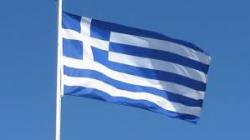By Michael Roberts
Today Greece officially came out of the strait-jacket of the so-called Troika bailout programme. The Troika of the Euro Group, the European Central Bank and the IMF, are now longer openly calling the shots on how the Greek government should spend its tax revenues or how much it can borrow.
However, Greece is not really free for two reasons. First, the Greek government has signed up to a new deal with the Euro Group which will involve an unending process of implementing strict fiscal spending measures including more ‘reforms’ in pensions and public services. In return, the Greeks get some so-called debt ‘relief’ on its public sector debt currently equivalent to 180% of Greek GDP.
Under the agreed debt-relief plan, maturities on E97bn ($112 billion) of loans Greece has received from its second bailout would be pushed out by ten more years. The extension will be accompanied by a ten-year grace period in interest and amortization payments on the same loans. Creditors also agreed to disburse E15bn aimed at helping Greece repay arrears, finance maturing debt and build up a cash buffer of E24bn.
So, Greece won’t have to start paying back what it ‘owes’ the Eurogroup until 2032. That sounds good. But the debt remains – and as one study explained in a past post on Greece: “To achieve debt sustainability without face-value debt relief …would imply a large increase in the total exposure to Greece of the European official sector from currently expected end-2018 levels, that is, by 50% or more. It would also mean that Greece could still be paying off debts to European official creditors well into the 22nd century.”!
The other shocking thing that has now been admitted is the IMF officials responsible for loans to Greece as part of the Troika programmes broke all the IMF rules and procedures and hid the facts from the IMF board. This has been revealed in a damning report by the IMF’s Independent Evaluation Office (IEO) which reports to the executive directors (government reps) over the heads of Christine Lagarde, the IMF managing director and her officials. In the bailouts of Greece, Portugal and Ireland, they were ‘allowed’ to borrow over 2000% of their allocated IMF quota in direct violation of the official limit of 435%.
This was not done because the IMF officials were trying to help these countries. No, the aim was to save the banks of Europe from going under because likely defaults on payment of government bonds that these banks held. French, German and British banks had bought government bonds from these distressed governments because they ‘earned’ a very high rate of interest and so they could make huge profits. Any defaults could have brought the whole European banking system down. Saving capitalism (finance capital) was more vital for the IMF, so the living standards and lives of Europeans had to suffer instead. As the Evaluation Report baldly says: “If preventing international contagion was an essential concern, the cost of its prevention should have been borne – at least in part – by the international community as the prime beneficiary,”.
There is still little ‘fiscal space’ to end austerity, let alone reverse it
When the Euro debt crisis broke, the IMF, the ECB and the EU ensured that the banks got nearly all their money back and also kept their profits – so no risk! In the meantime, Irish, Portuguese and Greek citizens faced years of severe austerity to meet Troika demands – what the then Greek finance minister Yanis Varoufakis has called “fiscal waterboarding”.
The Greeks still remain with a monstrous debt even if the burden of servicing that debt has been reduced. And there is still little ‘fiscal space’ to end austerity, let alone reverse it. As I said last May, “The reality is that with the Greek economy unlikely to grow at more than 2% a year after inflation for the foreseeable future and the burden of financing the debt standing at 15% of GDP each year and rising, there is no way that Greek capitalism can escape of the spectre of the debtors’ prison.”
Greece has lived through eight lost years. Since 2010, its economy has shrunk by one-quarter, the disposable income of its citizens by-one third. More than 300,000 of those people have emigrated; among those left, unemployment is at 20 per cent. Pavlos Ravanis, president of the Athens chamber of small business and a veteran entrepreneur, said: “Of the companies that were doing well before the crisis, about 20 per cent have innovated successfully and are flourishing, and another 40 per cent are getting by, servicing debt but not making money.” That leaves 40 per cent described as “zombies” by Mr Ravanis. “They are not paying tax or meeting their obligations to the banks,” he added. “Less than half [of these companies] are rescuable, even if an investor showed up willing to put in large amounts of cash.”
And if Greek economic growth slips below 2% or global capitalism enters a new recession, then the debt financing burden will rise out of control again.
August 9, 2018
First published on Michael Robert’s blogsite. For original article including graphs and charts, go to:



